How’s the weather? Ask The Weather Guys
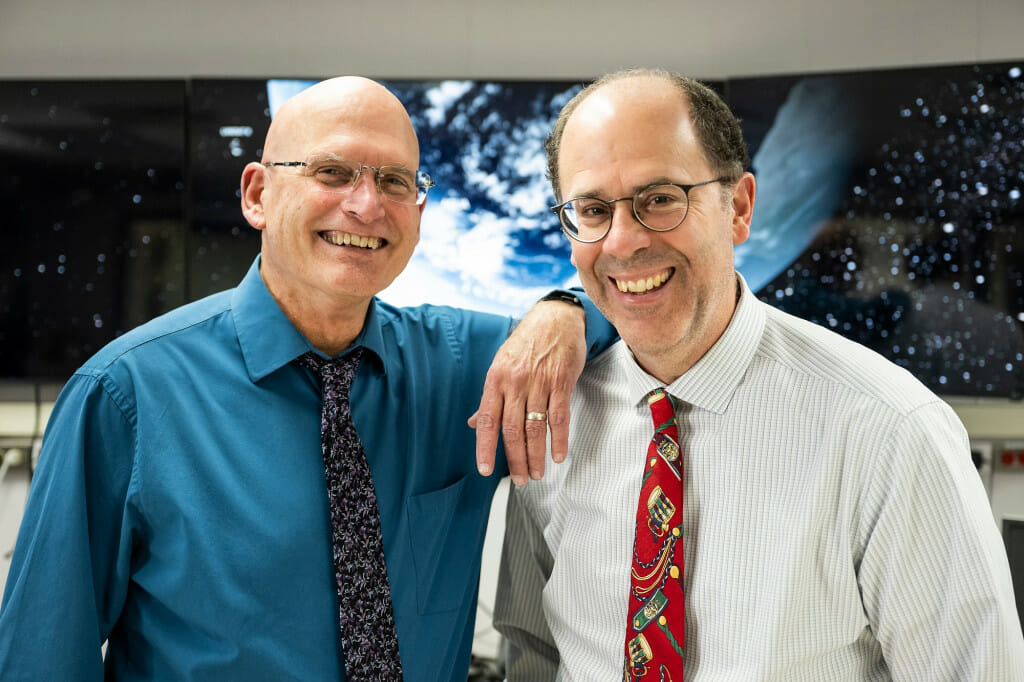
“The Weather Guys,” also known as Steve Ackerman (left) and Jonathan Martin, both professors of atmospheric and oceanic sciences, are pictured in a weather-forecasting facility in the Atmospheric, Oceanic and Space Sciences Building. Photo: Jeff Miller
Steve Ackerman and Jonathan Martin are both professors of atmospheric and oceanic sciences at the University of Wisconsin–Madison. But many know them by their more familiar moniker:
The Weather Guys.
For nearly 25 years, they’ve been regulars on Wisconsin Public Radio’s “The Larry Meiller Show.” Their “Ask the Weather Guys” column has run weekly in the Wisconsin State Journal since fall 2008 and numerous newspapers across the country have also picked it up.
How does one become a Weather Guy? Read on as we, well, ask the Ask the Weather Guys.
So, how’s the weather? (*while you’re answering these questions.)
Steve: A nice sunny Saturday evening, with a little wind.
Jon: We are near the end of a record cold streak for mid-October as I write the answers to these questions — two days on which it has snowed (Oct. 13 and 17) and record cold temps in a number of locations south of us across the eastern US. The weather is always exciting, but sometimes extremely exciting, like now!
How many times do you get asked that question? Do you ever get sick of it?
Steve: I never get sick of it, but it rarely comes during good weather. On those days it’s more of an exclamation of “What a great day!” For those people who know us both well, they know it’s better to ask that question of Jon – at least if they want an accurate answer.
Jon: My very first winter in Madison we got a 7” snowfall on Dec. 6, 1994. I was still getting to know my next-door neighbor at the time, and we found ourselves out shoveling our shared driveway the morning of Dec. 7. Thinking he was just initiating casual conversation he said, “What a storm, huh?” Instinctively I launched into a minutes-long discussion of what made this storm so interesting to me. When I finally came up for air he said, “Jon, you bring talking about the weather to a whole new level.” I never get sick of talking about the weather!
Where are you from?
Steve: Long Island, New York.
Jon: I am from Peabody, Massachusetts, the first town west of the more famous Salem where the Witchcraft Hysteria of 1692 occurred. This is on the North Shore of Massachusetts about 20 miles from Boston — entrance to the Atlantic storm track and a very snowy location.
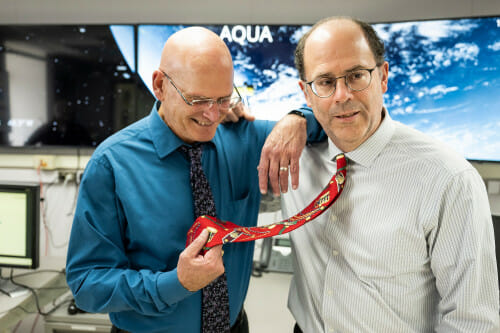
When you’re one of the Weather Guys, you need to have a weather-related tie. Photo: Jeff Miller
Were you always interested in the weather? How did it start?
Steve: I was interested in physics — applied physics. When I took an introductory course my freshman year on meteorology, I realized meteorology was just applied physics – and relevant applied physics at that. In other words, people benefited from it. So, my senior thesis for my bachelor’s degree in physics was to write a computer program to do a simple Barotropic Forecast Model — it took many tries, but eventually the Fortran code worked.
Jon: I can’t remember a time when I was not interested in the weather, so I have no idea how it started for me. I suspect it was the physical drama of weather systems, especially in the winter, that really caught my attention and never let go. When I was 8 years old, I started an eight-year tenure as a morning paper boy. Every day of the week I got an hour of private time to start the day and I saw all manner of meteorological phenomena. This was just a few years after the first moon landing, and I distinctly remember the sense of adventure I had making the first footprints in a new snowfall — just like Neil Armstrong had done on the moon! The magic surrounding those experiences fueled my interest.
What brought you to UW–Madison? And how long have you been at the university?
Steve: I came here in 1987 as a research scientist to work at the Cooperative Institute for Meteorological Satellite Studies. My research at the time was African Dust storms and their weather and climate impact and planet’s energy budget. The best way to study them was using data collected by weather satellites. And since the University of Wisconsin is considered the birthplace of weather satellites, when I was invited to visit and apply for a job, I jumped at it. Madison is a great city to live in too! I eventually joined the Atmospheric and Oceanic Sciences faculty in 1992.
Jon: When I was approaching the end of my post-doctoral appointment at the University of Washington, a job announcement came from UW–Madison (I think it was November 1993). I jumped at the chance to apply, as I knew this was a department (and a university) with a very high-profile reputation for excellence. I also knew that if I could somehow land the job, I would be living in a place that had a real winter with snow (unlike Seattle!) It was a perfect fit for me so I applied and hoped for the best. As it turns out, I was offered the job and began here in August 1994. It has been a remarkable 30 years – things could not have worked out better for me and my family.
Compare forecasting now to when you first started. What are the biggest differences? And what advances do you think are next?
Steve: Forecasts are much more accurate today than when I first started. I think that is because of a better understanding of the physical process of the atmosphere, which led to better understanding and thus better weather prediction computer models. Better, faster computers also helped, as did better and more observations, such as satellite dates.
Jon: Forecasting has undergone a silent revolution in the 30 years I have been here in Madison. In 1994 we were about 25 years into what I consider the most unheralded scientific advance of the second half of the 20th century, numerical weather prediction — the use of the computer to program the laws of physics in such a way as to enable reasonable forecasts of the weather. When I arrived, I think it is safe to say that a three-day forecast was a bit of a stretch in terms of accuracy. Today, with continued scientific developments and improvements in both computer power and observational capabilities (like satellite and radar data), forecasts out to five or even seven days will almost always paint the complexion of the coming weather accurately. It is remarkable!
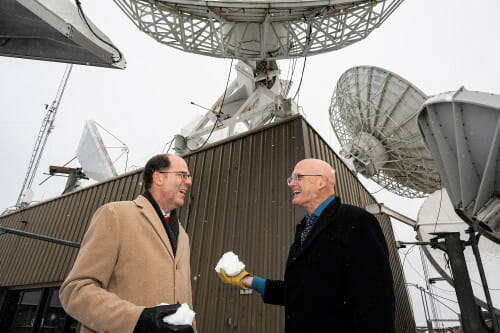
The Weather Guys have snowballs at the ready. Photo: Jeff Miller
For students interested in studying meteorology, what interests and skills are beneficial?
Steve: Math, physics and a passion to engage with the weather.
Jon: I think the most important skill for any budding scientist, and certainly for a weather/climate scientist, is developing an active curiosity about nature. I am struck by the fact that my most successful students, at both the graduate and undergraduate level, are propelled not so much by raw intelligence but by a roving curiosity. That being said, it really helps if that curiosity carries over to a healthy level of interest in mathematics because so much of the way we formalize our understanding of physical processes comes clothed in mathematics.
Again, a person interested in the weather and climate needs to also be able to explain complicated ideas in a clear fashion so communication skills are absolutely essential to success. Consequently, one should pay attention to how to write and speak very clearly. I once had a student in class who objected to my voluminous comments on his homework, some of which had directly to do with his lack of clarity in explanation. He eventually said to me, “This isn’t an English class!” I responded, “Everything is an English class!”
Sometimes the forecast helps us figure out the best day to wash our car or go for a hike. But forecasting extreme weather can save lives. How different is this compared to 50 or even 100 years ago?
Steve: Way different! Our accuracy of weather forecasts has really improved. I was applying to enter graduate school in the fall of 1975 when a storm on November 10 contributed to the sinking of the Edmund Fitzgerald. A poor two-day forecast led the captain to change the route, which in the end contributed to the sinking of the ship. In early November 1998, we had a nearly identical storm, and the accuracy was demonstrably better. The other big difference is the public access to weather and weather-related data. You can receive automatic severe weather warnings on your cell phone.
Jon: There was absolutely ZERO ability to forecast extreme weather 100 years ago — because even a one-day forecast then was about as accurate as a 7-10 day forecast is today. Fifty years ago, the state-of-the-art numerical forecast model pretended the atmosphere had seven levels from the ground to about 10 miles above the ground (today such models pretend there are over 80 such levels). So, even in 1972 extreme weather events were almost always a surprise. That is certainly not the case today.
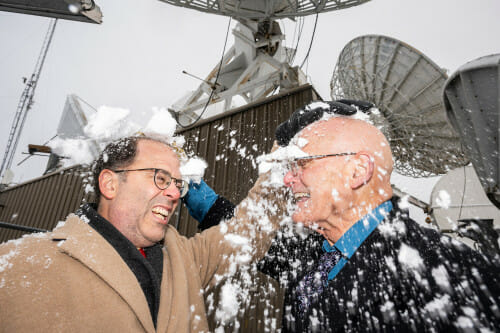
The Weather Guys engage in a friendly snowball fight. Photo: Jeff Miller
Winter’s coming. What kind of winter can Wisconsin expect?
Steve: The winter climate is cold. 😀
Jon: There really are very few reliable indicators that one can use to make such a seasonal forecast. If the tropical Pacific Ocean sea-surface temperatures are warmer than normal near the dateline and eastward toward Peru (El Niño), we can often safely predict that the ensuing winter will be warmer and rainier than normal here in southern Wisconsin. If the opposite anomalies in sea-surface temperature exist there (La Niña), there is little reliable response over our area. Right now there appears to be a 75 percent chance of La Niña conditions for this winter. I’m hoping that means that we will have a winter that is more normal in terms of snow and cold as compared to the last few that have been warmer and less snowy than usual.
What’s your idea of perfect weather? Ideal temperature?
Steve: A sunny spring day that is not humid nor windy, with tulips in bloom. Or, a fall sunny day that is not too cold, with color of the trees.
Jon: I love the weather from 15 September to 15 October the best. Nights are usually cool, but days can be pleasantly warm. It tends to be relatively dry during that month as well. The cool nights tend to rid us of pesky insects so being out during the day and at night is easier. Finally, there is no reasonable expectation of snow so I cannot suffer the great disappointments that come along later in the winter when I anticipate a snowfall and it does not materialize. That always leaves me frustrated.
Favorite season? Least favorite? Why?
Steve: I like all the seasons, the different seasons allow us to do different things — skiing in winter, boating in summer. But I do favor the fall time when the trees are changing colors, on a clear blue sky day with no wind.
Jon: My favorite season, despite the cautions just expressed, is winter because no other season offers such a stark reminder that we are perilously close to outer space and its frigidity. I love the fact that extremely cold air can be brewed simply by a lack of sunlight at high latitudes and that occasionally it finds its way to where I live to remind me. I don’t have a least favorite season – if I were pressed, I guess I would say early spring when the occasional warm day can tease one into believing winter is over only to be followed by an additional cold blast.
Be honest. Do you ever get caught without an umbrella on a rainy day?
Steve: Yes, now and then I do, but not often. If I think there is even a low chance of rain, I’ll carry an umbrella. It would look bad for a Weather Guy to get caught in the rain without an umbrella (or raincoat). And, if it doesn’t rain, I assume people think that I may know something about the chance of rain that they don’t.
Jon: All the time – I almost never pay enough attention since my commute on the bus is so easy.
Any favorite weather-related movies or songs?
Steve: “The Perfect Storm” as a weather movie. And “The Sinking of the Edmund Fitzgerald” as a song that pretty accurately covers the situations of events during the storm.
Jon: I love “Groundhog Day” with Bill Murray and “Have You Ever Seen the Rain” by CCR.
How about weather jokes? (What happens when it rains cats and dogs? You might step in a poodle. Groan. And sorry.)
Jon: The weather is not a joking matter.
You can keep up with the weather and The Weather Guys Mondays in The Wisconsin State Journal and the last Monday of the month on The Larry Meiller Show on Wisconsin Public Radio at 11:45 a.m. For more, check out their web site here.
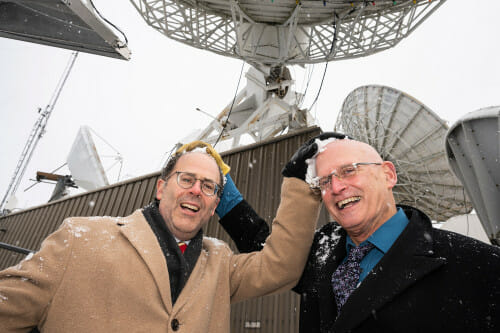
Snowball fight over, The Weather Guys remain on friendly terms. Photo: Jeff Miller
